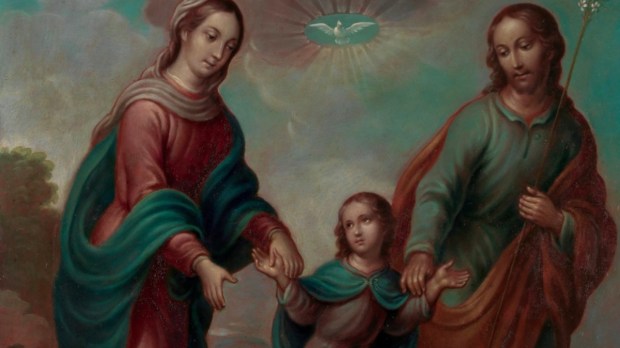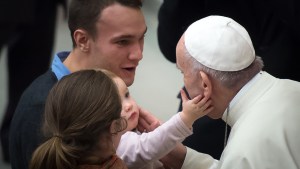Lenten Campaign 2025
This content is free of charge, as are all our articles.
Support us with a donation that is tax-deductible and enable us to continue to reach millions of readers.
As a father trying to raise children in our mixed-up modern world, there has always been some ambiguity in my mind about my proper role in relation to my wife and children. My inclination is to exercise my fatherhood as leader of the household, while allowing my wife equal say in our mutual decisions. I desire to protect my wife and children to the best of my ability, while acknowledging that my wife is quite capable of protecting herself. I also feel a responsibility to provide for my family financially, while, again, noting that my wife is talented and organized and can easily provide for herself.
For a father, particularly for a Catholic father, there exists a tension: What does it mean to take on the responsibilities of fatherhood and the headship of a household without oppressing or subjugating your wife and children? What does it mean to love them?
The responsibilities of being a guardian
I read an interesting essay recently by Julian Kwasniewski on the responsibilities of men as guardians. Kwasniewski notes that a father’s vocation is to guard his family from a hostile world and keep them safe. He stands between the world and his family. The concept of father as guardian is an interesting one. It’s an idea that some indignant women and children might well reject, claiming that they don’t need a man to babysit them. But I think there’s more to Kwasniewski’s point, and it’s worth exploring.
The essay got me thinking and sent me to some old writings by St. Edith Stein. In a talk titled, “The Separate Vocations of Man and Woman According to Nature and Grace,” she makes the point that to have a vocation means to have a specific calling. Men and women, at the most fundamental level, have specific callings according to their intrinsic nature as men and women. To put it simply – men are called to fatherhood and women to motherhood.
This calling can either be physical or spiritual, but these vocations are distinct to each sex and are not interchangeable. To believe this, Stein is clear (and she teaches this as an educated woman with advanced philosophy degrees who was active in social and intellectual life), is not to set either man or woman apart as being superior. Instead, she says, the vocations are complementary.
On this Father’s Day, and for all us dads who every single day are trying to fulfill our vocation the best we possibly can, these are interesting questions to ponder — what is the vocation of fatherhood, what are the specific duties given to fathers, and what does it mean for a father to be the guardian of his family?
Adam, caretaker of the Garden of Eden
Stein notes that in the opening chapters of Genesis, God charges Adam with the responsibility of cultivating and preserving the home into which he has been placed. As part of his very nature, Adam is meant to be caretaker of the Garden of Eden and everything in it. This holds particularly true in regard to his family; Adam was created first and so has responsibilities to all who come after him.
Adam does not guard and protect his family because he is superior to the others, or the only one capable of it. Rather, he guards his family because a father’s family is equivalent to his own flesh. He and his wife are one flesh, and the children are the fruit of their union. His family is his body.
A desire to help your family reach its full potential
Personally, I want every part of my physical body to reach its full potential. I exercise to make my muscles, lungs, and heart stronger. I shave and cut my hair to look presentable. I eat healthy so I will feel vigorous. These actions give me maximum freedom to live my life.
It’s the same with a family. A father should greatly desire to assist his wife and children in achieving their fullest potential. This is why he guards their efforts, encourages them, and provides for them.
For instance, I don’t make my young children earn money to pay their room and board. That would hamper their potential by denying them educational opportunities, friendships, and the freedom to develop and explore their vocations. No, I happily support them because I want what is best for them. An added bonus is that they will mature with gifts and talents that greatly compensate in areas where I am lacking. We are more complete together.
Acting as a spiritual guardian
A father also protects his family as he would his own body when he protects their spiritual life. The body is shaped by the soul. It is united to the soul. Without a soul, a body is lifeless.
As the guardian of my family, it is my responsibility to take them to Mass and allow the Church to offer them the sacraments, show them how to pray, and assist them in developing their interior life. This is mostly accomplished through my personal example. I take seriously my own spiritual fatherhood and my faith. In doing so, I make clear the way in which a life brought to its fullest potential includes spiritual devotion and gives glory to God.
Towards the end of her lecture, St. Edith Stein summarizes the role of a father. She says that the vocation of a father is to know and understand the world and his place in it, to enjoy gratefully the life God has given him, and to assist as best he can with the perfection of that creation. In other words, his role is to help his family become amazing, to love God, and become happier and happier every day.



